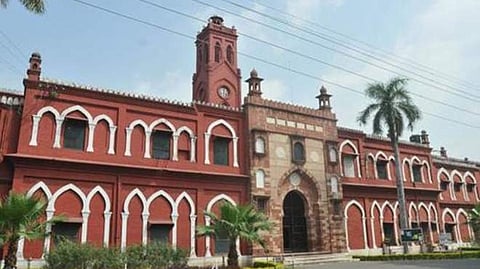

NEW DELHI: The Supreme Court, in a 4:3 majority ruling, overruled its 1967 decision which held that Aligarh Muslim University (AMU) can't claim minority status as it was created by a statute.
The seven-judge Constitution Bench, headed by Chief Justice of India (CJI) D.Y. Chandrachud, ruled that the issue of AMU's minority status would now be decided by a regular Bench to determine whether the institution was "established" by a minority community.
CJI Chandrachud, who authored the majority opinion on behalf of Justices Sanjiv Khanna, J.B. Pardiwala, and Manoj Misra, stated that the earlier decision in Azeez Basha had been overruled.Dissenting opinions were authored by Justices Surya Kant, Dipankar Datta, and S.C. Sharma.
The majority ruled that the determination of AMU's minority status must be based on the legal tests laid down in this case. The matter will now be placed before the CJI for constituting a Bench to decide on the issue, as well as the correctness of the 2006 Allahabad High Court judgment, which had struck down AMU’s minority status.
In its verdict, the Court held that valid proof of the minority community's intent to establish the institution could be shown through letters, communication, and other materials. The Court observed that the minority character of an institution need not be proven solely by demonstrating that the institution is administered by the minority community.
“It is not necessary that the purpose of the minority can be implemented only if persons from the minority community administer the institution,” CJI Chandrachud said while reading out the judgment.
The Bench further ruled that the institution must satisfy the test of being a minority institution as of the date of the adoption of the Constitution. Documentary evidence, including office documents, memorandums, and secondary sources, could be used to establish its minority status.
The Court pronounced its verdict after reserving judgment on February 1, following eight days of exhaustive arguments that commenced on January 23. The legal issue was examined in the context of Article 30 of the Constitution of India, which guarantees minorities the right to establish and administer educational institutions of their choice.
Article 30, adopted on December 8, 1948, affirms: “All minorities, whether based on religion or language, shall have the right to establish and administer educational institutions of their choice.”
The question of AMU’s minority status was referred to a seven-judge Bench by a three-judge Bench of the Supreme Court in 2019. One of the key issues was whether a university established and governed by statute, such as the AMU Act of 1920, could claim minority status.
In January 2006, the Allahabad High Court had struck down the provision of the 1981 law which had accorded AMU minority status.
Senior advocates Dr Rajeev Dhavan, Kapil Sibal, Salman Khurshid, and Shadan Farasat appeared for AMU and intervenors, including the AMU Old Boys' Association.
The Union of India (UOI) was represented by Attorney General R. Venkataramani and Solicitor General Tushar Mehta, alongside other senior advocates including Neeraj Kishan Kaul, Guru Krishna Kumar, Vinay Navare, and Yatinder Singh. Additional Solicitor Generals Vikramjit Banerjee and K.M. Nataraj also advanced arguments on behalf of respondents and intervenors.